Is Malaysia a Good Software Development Outsourcing Destination?
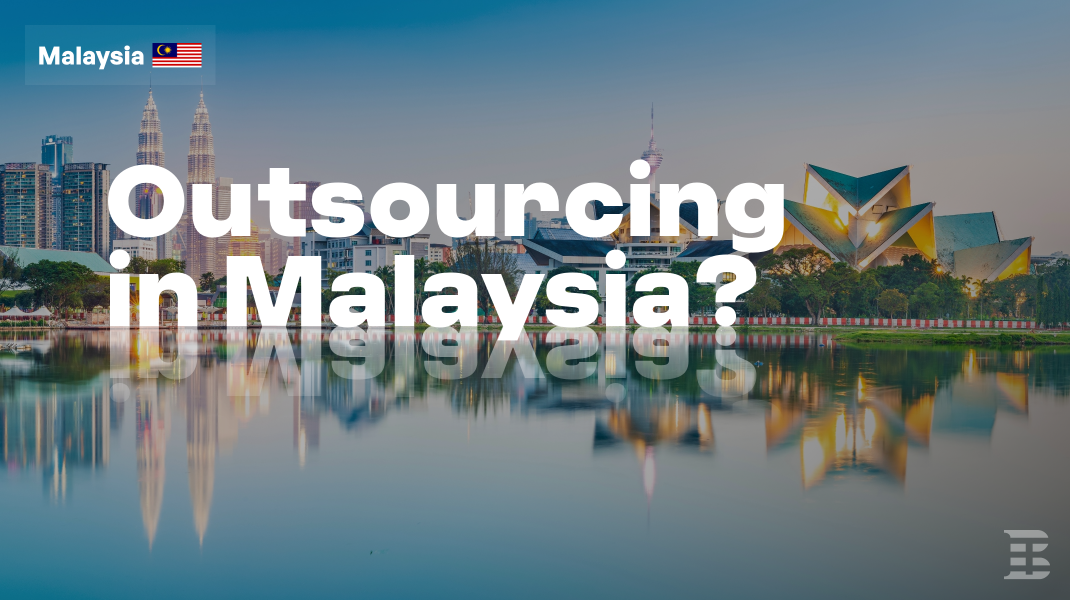
Offshore outsourcing works by giving specific business processes to a company from another country. Frequently, these nations have lower work costs, for instance, Ukraine, Mexico, India, or Colombia. This approach can embrace full IT operations or particular tasks, like software development, quality assurance, or improving legacy systems. For companies looking to increase efficiency and access specialized expertise, software development outsourcing has become a vital strategy.
An appealing outsourcing destination known for its Software development, IT, and Business Process Outsourcing (BPO) offshoring services is Malaysia. This country is a recognized and powerful player, but also a competitor for the top outsourcing countries in 2025. It received a good ranking from companies worldwide. Malaysia has a fascinating value-oriented philosophy and is also cost-effective.
In 2025 and beyond, outsourcing will be more than a business plan. It will become a transitional power, boosting a number of factors. This includes cost efficiency, specialization, and global competitiveness. As companies search this outsourcing landscape, smart outsourcing decisions will define their ability to innovate, scale, and thrive in an interconnected business environment.

Malaysia's Appeal as an Outsourcing Destination
Malaysia has positioned itself as a persuasive outsourcing location, due to its rapidly growing IT industry, encouraging government policies, and thriving tech centers.
Malaysia’s IT Industry’s Growth
This nation’s IT sector has seen important expansion, driven by both local innovation and foreign investments. In 2024, tech giants known worldwide like Amazon Web Services (AWS), Google, and Microsoft funded $16.9 billion to Malaysia’s digital ecosystem to support its position as a regional tech hub. These collaborations with big tech companies attract not only international investments but also power Malaysia’s competence in the ASEAN region.
Malaysia boasts a vibrant ecosystem of startups, accelerators, and innovation centers. Initiatives like Malaysia Digital Hub and Digital Free Trade Zone (DFTZ) are created to sustain regional tech startups and attract players worldwide.
The rollout of 5G technology, led by Digital National Berhad (DNB), is working on transforming Malaysia’s connectivity landscape. Despite initial issues, this initiative highlights the country’s dedication to becoming a digital leader. In addition, Malaysia is also attractive to major software development firms, which benefit from its skilled, multilingual workforce, and cost-effective labor market.
Government Policies Supporting Software Development & Outsourcing
The Malaysian government has actively encouraged IT development with help from initiatives such as:
Malaysia Digital Economy Blueprint (MyDIGITAL)
This initiative aims to develop Malaysia into a digitally-powered nation by 2030. It has its focus on
- Expanding the digital infrastructure, including 5G rollout;
- Encouraging international investments in IT and software development;
- Providing tax incentives for tech firms.
National Policy on Science, Technology, and Innovation (DSTIN)
DSTIN (2021-2030) is working on reducing reliance on foreign technologies and encouraging local innovation. This initiative reaches its goal by:
- Investing in R&D for software development.
- Encouraging collaboration between industry, government, and education;
- Strengthening STEM education to improve tech talent.
Economic Transformation Programme (ETP)
Is prioritizing IT and digital services as key economic drivers, and in addition;
- Supports investments;
- Improves digital networks;
- Developing technology parks, and smart cities, like Cyberjaya.
These policies jointly raise Malaysia’s outsourcing attractiveness. It enhances the position of this country as a competitive location for software development.
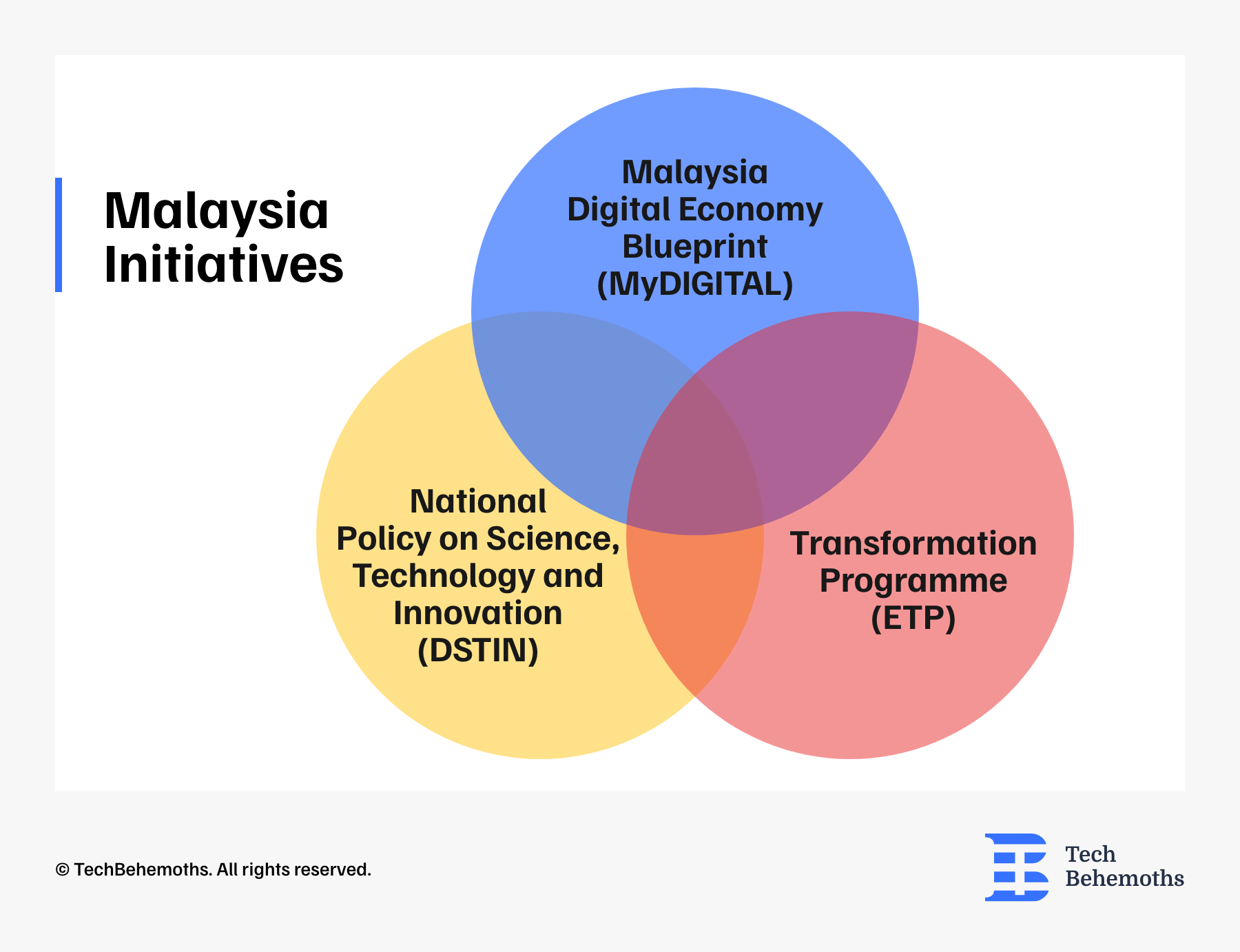
Presence of Tech Hubs and Innovation Centers
Malaysia is known for its technology parks and innovation centers, including:
- Cyberjaya - Often referred to as Malaysia’s “Silicon Valley”, fosters numerous IT companies and startups.
- Penang Science Park is a nest for tech industries and software development.
- MaGIC (Malaysian Global Innovation & Creativity Center) supports startups and encourages innovation.
With a remarkable infrastructure, government backing, and a dynamic tech environment, Malaysia continues to rise as a top outsourcing location.
Best Cities for Software Development Outsourcing in Malaysia
Malaysia offers several cities that are perfect for software development outsourcing, thanks to their framework, skilled labor force, and business-friendly ecosystem.
- Kuala Lumpur is a nest for technology and innovation. It is home to the Multimedia Super Corridor (MSC), which fosters numerous IT and multimedia companies.
- Cyberjaya is a planned smart city that focuses on technology and innovation. It offers excellent institutes for IT companies and is part of the MSC.
- Penang is known for its manufacturing and IT industries. It has a growing tech environment and is a popular choice for outsourcing.
- Johor Bahru, located near Singapore, benefits from its proximity to international markets and has a growing IT sector.
Skilled Workforce and Education
Malaysia’s outsourcing possibilities are significantly strengthened by two key factors. These include the skilled workforce and educational systems, especially in the IT sector.
Quality of IT Education in Malaysian Universities
With 20 public universities and more than 80 private institutions, Malaysia has a strong higher education system. Together with approximately 1,400 technical and educational and training (TVET) colleges. Various private facilities have set up branch campuses in the country, for example:
- Heriot-Watt University;
- University Medicine Malaysia;
- Xiamen University Malaysia;
- University of Reading Malaysia;
- Nottingham Malaysia.
Educational institutes in Malaysia generate an ample pool of professionals, providing them with degrees and qualifications for post-graduates.
The Malaysian Educational Blueprint 2015-2025 emphasizes industry collaboration. It encourages industry partnerships, making sure that graduates are equipped with the needed skills in real life in areas like AI, robotics, and computer science. This focus on STEM education increases the competency of IT graduates. It makes them well-prepared for outsourcing roles.
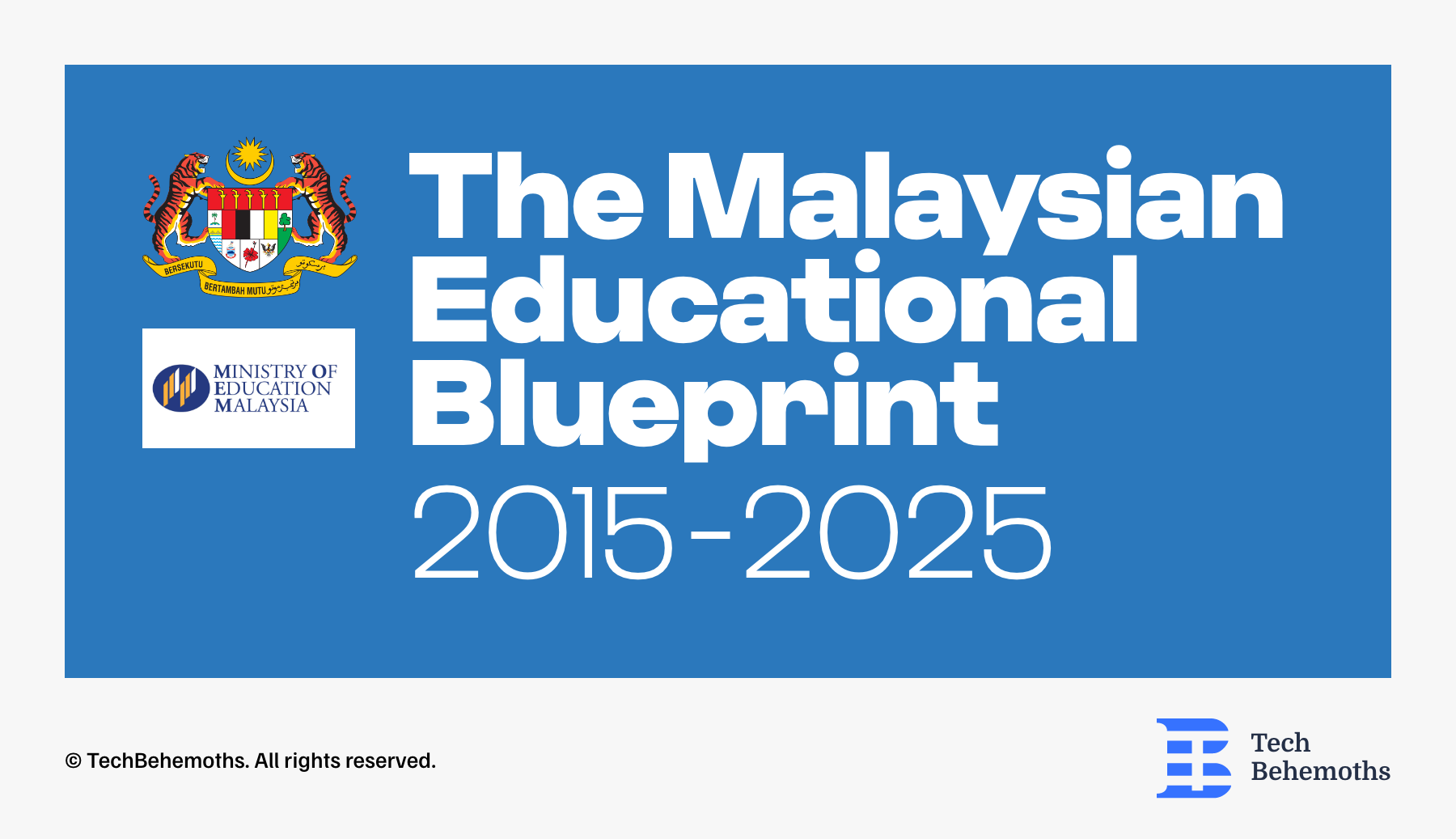
Availability of Skilled Developers and Tech Professionals
This nation has a highly competent labor force, especially in engineering, manufacturing, and IT-related domains. Malaysia’s government actively sustains talent development, assuring a steady number of tech professionals. In addition, private sector initiatives supplement government attempts. It provides a large pool of professionals and semi-professionals. This makes sure that outsourcing companies can access a diverse and competent workforce.
English Proficiency and Its Impact on Outsourcing
English proficiency is a major advantage for Malaysia in the outsourcing industry. The majority of this country’s professionals are multilingual, with high levels of English competence. This is particularly advantageous for global outsourcing, as it eases seamless communication with foreign clients. Employers focus on powerful communication abilities, making English a vital factor in hiring decisions. Also, the TVET system integrates English training, ensuring that graduates are market-ready.
Malaysia’s Outsourcing Position
According to Statista, Malaysia is positioning itself as a rising force in the global IT outsourcing industry. It is supported by growth projections and key rivalry advantages. By 2025, the country’s IT outsourcing market is expected to generate $2,2 billion, with an annual growth rate of 9,86%, leading to a market value of $3.21 billion by 2029.
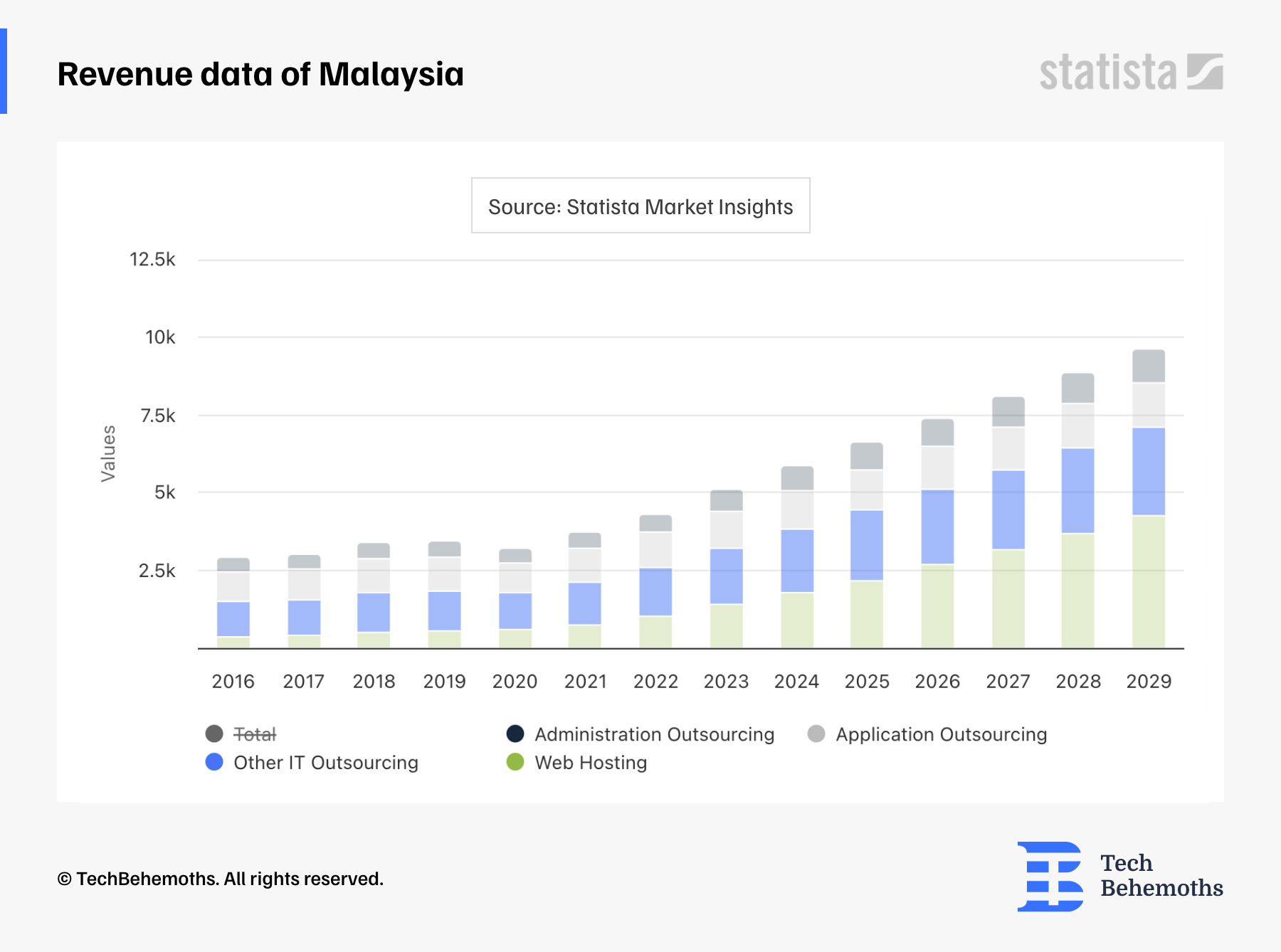
In addition, the average Spend per Employee in the field is estimated at $119,32 in 2025, which signals significant investments in the workforce and industry development. While the United States remains the global leader in IT sourcing, with a projected revenue of $213,57 billion, Malaysia represents a competitive alternative due to its unique strengths.
Combining strong IT education networks, a talented labor force, and high English proficiency, Malaysia is well-ranked as an outsourcing center. The government’s dedication to education and workforce development assures a steady flow of tech talent. This makes this country an attractive destination for software development outsourcing.
Cost-effectiveness and Business Environment
Malaysia is a cost-effective and business-friendly ecosystem for outsourcing. It makes a strong rival to destinations like India and Vietnam. Here are the highlighted comparisons:
Comparison of Outsourcing Costs
Malaysia offers competitive outsourcing costs, despite them being slightly higher than Vietnam, but lower than India for certain services. Vietnam, known for its low workforce costs, is more appealing to companies that are seeking budget-conscious outsourcing. Despite that, Malaysia gives an equilibrium between affordability and quality. This country also provides a highly skilled workforce and strong architecture.
| Factor | Malaysia | Vietnam | India |
|---|---|---|---|
| Labor Costs | Moderate, higher than Vietnam but competitive with India. | Lowest labor costs, very cost-effective. | Very widely, entry-level costs are lower, but senior talent is pricier. |
| Infrastructure & Tech Costs | Strong digital infrastructure, government-backed funding. |
Growing but less developed infrastructure. |
Established infrastructure, but costs can be high in major cities. |
| Business Setup Costs | Tax incentives ease entry costs. | Low setup costs, but bureaucratic hurdles. |
Competitive but complex legal framework. |
Why Malaysia?
This nation offers a more predictable
- business ecosystem
- uniting affordability with high-quality service delivery
Making it perfect for outsourcing IT development, software services, and shared service operations.
Ease of Doing Business in Malaysia
Malaysia is ranked as one of the more business-friendly economies in Southeast Asia, thanks to several factors. For instance, pro-business policies, a strong framework, and a strategic location.

Combining other key aspects, these are contributing to the ease of doing business in Malaysia, and these are:
- Registering a business in Malaysia is made simple and efficient, with help from digital platforms streamlining the process.
- Infrastructure and connectivity, Malaysia features modern infrastructure, including well-developed transport networks and digital connectivity, which makes this nation appealing to businesses.
- Government support and incentives, this country provides various tax incentives and investment-friendly policies. Especially in domains like tech, manufacturing, and green energy.
- Trade and investment agreements, Malaysia is part of major trade agreements, for example, the Regional Comprehensive Economic Partnership (RCEP). As well as the Progressive Agreement for Trans-Pacific Partnership (CPTPP) and the Comprehensive. These partnerships are increasing its position in global trade.
- Legal and regulatory framework, the nation has transparent regulations for business processes, including safety for minority investors and efficient contract enforcement.
- Taxation and financial systems, Malaysia has a competitive tax structure and a robust banking system, which has a goal to support business growth.
Challenges and Considerations
Malaysia has become an admirable software development outsourcing location with a promising future. But, there are several challenges and issues to keep in mind, and these include:
Time Zone Differences & Communication Barriers
Time zone differences and communication barriers are critical considerations in outsourcing software development to Malaysia.
Time Zone Differences
Malaysia works in GMT+8, which can cause scheduling problems for companies in regions like America and Europe. This can create delays in real-time communication and decision-making.
To decrease this, companies often follow asynchronous communication methods. Using tools like email, project management platforms, and collaborative software permits team members to contribute within their own working hours.
One more strategy is applying overlapping work hours, where both teams agree on a part of the day for real-time collaboration. This increases crucial discussions and decisions are addressed rapidly.
Communication Barriers
Despite the fact that English proficiency is generally high in Malaysia, there are cultural nuances and differences in communication. Sometimes this can lead to misunderstandings and delay work processes.
Effective communication requires clear documentation, regular updates, and structured workflows. Tools like Slack, Zoom, and Trello can unite gaps and facilitate smooth partnerships.
Building a robust company culture that values inclusivity and active listening can also increase communication across various teams.
Intellectual Property (IP) Protection
Intellectual property protection is a crucial challenge when outsourcing software development to Malaysia. While Malaysia has laws protecting it, concerns remain regarding enforcement and safety, especially in tech and manufacturing.

Legal Framework
This country has a powerful IP protection system, governed by the Intellectual Property Corporation of Malaysia (MyIPO). This agency oversees copyrights, industrial designs, trademarks, patents, and a range of other intellectual property. Malaysia takes part in international agreements like the World Intellectual Property Organization (WIPO), the Berne Convention, and the Paris Convention. These collaborations assure alignment with global IP standards.
Software can be protected under the Copyright Act 1987. Patents are governed by the Patents Act 1983, giving safety for inventions that meet criteria like industrial applicability.
Challenges and Safeguards
Despite powerful laws, enforcement can sometimes be inconsistent. Businesses may face risks like IP theft or unauthorized use of proprietary information. To resolve these issues, businesses can draft comprehensive contracts and Non-Disclosure Agreements (NDAs). This is made to define IP ownership and usage rights. In addition, another measure is to conduct diligence to ensure the outsourcing partner has a good reputation and follows ethical practices. And lastly, consider registering the IP in Malaysia to strengthen legal standing in case of disputes.
Case Studies and Success Stories
Malaysia has become a thriving hub for software development, attracting global companies with its skilled labor force, cost-effectiveness, and supportive environment. There is a list of successful cases that have chosen to outsource software development in Malaysia. It includes companies like Grab, Maybank, and Axiata.
- Grab is a company founded in Malaysia and has grown into a leading ride-hailing and food delivery platform in Southeast Asia. The nation’s tech ecosystem played a crucial role in its early moments. It offers access to skilled developers and government support.
- Maybank is one of the biggest financial institutions in Malaysia. It uses the local IT talent to create a digital platform named Maybank2u. This company revolutionized digital banking in this nation, representing Malaysia's capability in fintech.
- Axiata represents a major telecommunications company. It utilized Malaysia’s IT environment to increase its digital services, such as AI-driven customer support and advanced analytics.
Testimonials from Businesses
Businesses that have outsourced to Malaysia often benefit from its unique advantages. These are cost-effectiveness, a skilled workforce, and supportive government policies. The country’s appeal as a regional and global hub is represented by many well-known companies. These firms have established regional and international facilities in Malaysia. Including BMW, DHL, IBM, Intel, ACS, HSBC, Motorola, Nokia, and many others. Here are a few testimonials and insights:
- Tech giants, companies like Microsoft and Intel, have built regional offices and R&D centers in Malaysia. These companies praise Malaysia’s multilingual labor force and robust infrastructure, which enable smooth operations and innovation.
- Startups and entrepreneurs recommend Malaysia’s vibrant startup environment, sustained by initiatives like MaGIC. This ecosystem nurtures creativity and provides resources for rising businesses.
- Strategic location, this country’s position in Southeast Asia gives easy access to high-growth markets. It makes Malaysia a perfect base for regional expansion.
These testimonials underline Malaysia’s strengths as a software development location.
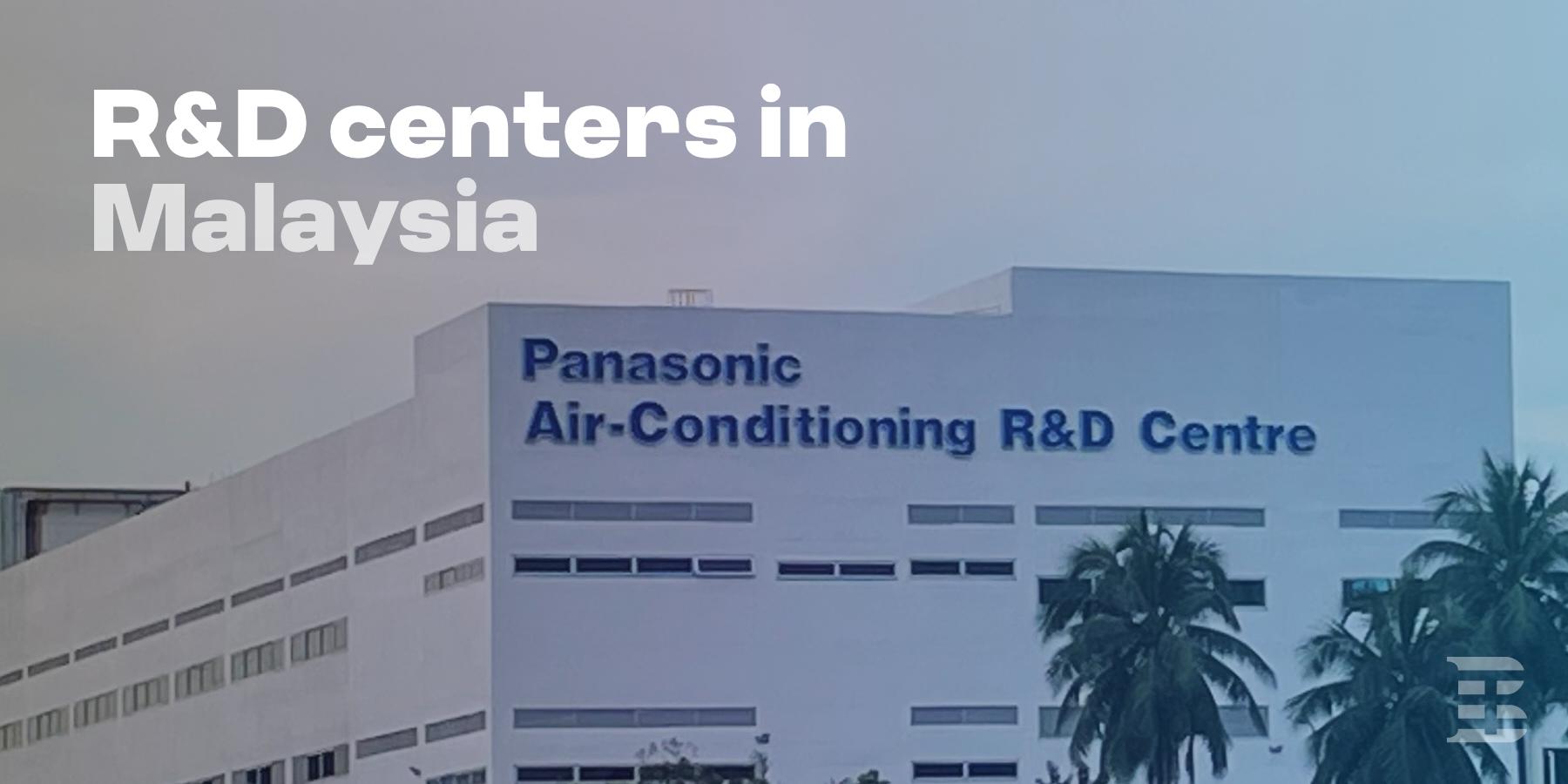
Conclusion
Malaysia is a representation of a premier outsourcing destination for several reasons. It includes its dynamic IT industry, proactive government policies, innovative tech hubs, and highly skilled multilingual workforce. Backed by a strong educational system, cost-effectiveness, and English proficiency, it offers an equilibrated environment for businesses that seek quality and affordability.
However, difficulties such as different time zones, IP protection, and communication barriers require strategic solutions, such as asynchronous communication, powerful contracts, and conscious partner selection. Despite these issues, Malaysia’s strong points are validated by global companies like Google and Microsoft and success stories like Grab, Maybank, and Axiata.
With its unique advantages and ability to encourage innovation, this nation thrives in the global outsourcing landscape. It is placed as an attractive choice for software development outsourcing.